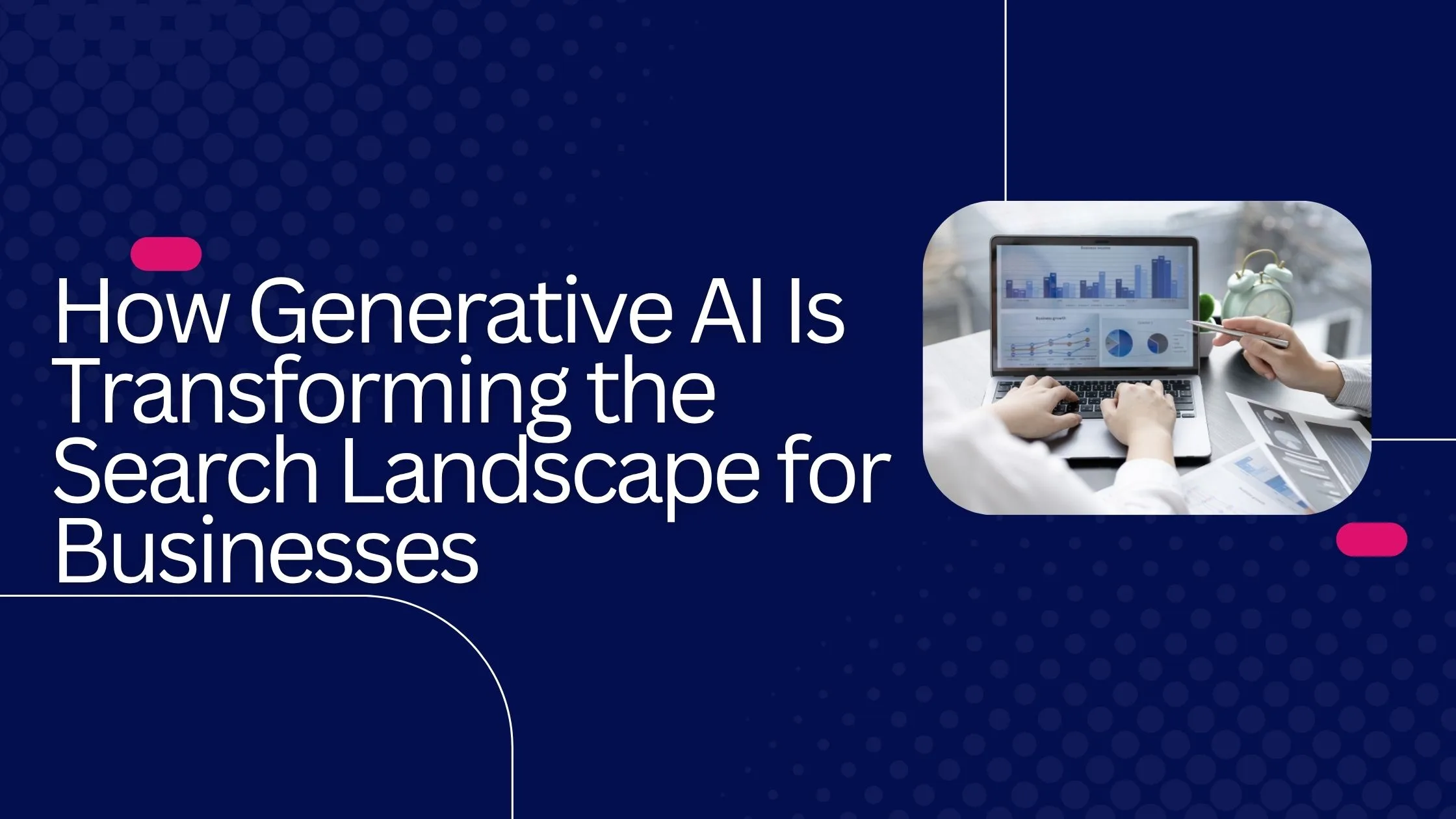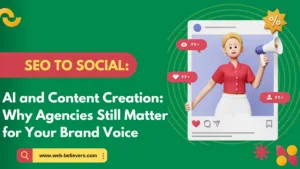Content creation has evolved significantly—from writing for human readers, to optimizing for search engines, and now, developing content that engages with artificial intelligence (AI).
Recently, the rise of generative search experiences—a sophisticated AI-powered search capability—has begun to revolutionize the way search engines function. These systems are becoming more intelligent, responsive, and context-sensitive than ever before.
For businesses, this shift presents a new challenge: adapting to this evolving landscape to remain visible—or risk falling behind.
This article delves into how generative search is redefining search engine optimization (SEO) for business owners, digital marketers, and professionals, and how enterprise-level generative AI can be strategically used to maintain a competitive edge.
Generative AI’s Impact on Modern Search Engines
Generative AI has rapidly evolved from an emerging innovation to a transformative force in how people engage with digital technology.
Tools like GPT-4 analyze vast datasets to deliver intelligent, context-aware replies. But this advancement is just a glimpse of how deeply AI is integrating into the tools we use daily.
Take Google’s generative AI-powered search, for example—also known as AI Overviews. Instead of scanning through pages of traditional search results, users are now presented with a concise, AI-crafted summary right at the top. This shift has made search more interactive and aligned with user intent.
In the U.S., Google’s follow-up feature enhances this further, letting users continue the conversation by clicking “follow-up” to ask more questions or request deeper insights.
This new AI-driven search experience simplifies the process of finding information—especially for those unsure where to begin or looking for specific details.
It feels less like browsing through a directory and more like having a conversation with someone who delivers the answers you need.
The Way We Search, Shop, and Access Information Has Changed Forever
With the rollout of Google AI Overviews, the Google Shopping experience has also undergone a major transformation—now powered by artificial intelligence to better tailor the online shopping process. Launched in the U.S. in October 2024, this new version enhances how users discover products, compare prices, and even try on clothing virtually.
AI now provides comprehensive product overviews that include reviews, ratings, pricing, and visuals—all in one view. This has redefined online shopping, making it faster, more efficient, and uniquely personalized, reducing the need for extensive browsing.
But the impact goes far beyond retail.
“Industries across the board stand to benefit from AI capabilities like Google’s AI Overviews,” shared Don Gruspe, Web Believers’s Demand Generation SEO Strategist.
“In healthcare, AI can simplify diagnostics and create tailored treatment plans. In finance, it helps professionals quickly interpret market data to guide investment strategies. Retail businesses gain from personalized product suggestions, while education professionals can tap into AI for improving teaching methodologies.”
Essentially, any industry that depends on data-driven insights and decisions can experience major advantages through these innovations.
Google’s generative AI search represents a fundamental shift in how users interact with search engines. Rather than relying solely on keyword matches, AI search tools can now understand the broader intent behind a query through advanced language modeling.
For SEO practitioners, this signals a major change. The focus must shift from simply ranking on page one to creating content that AI identifies as authoritative and contextually relevant. Success now means delivering comprehensive, high-quality answers that AI systems can interpret, summarize, and display—requiring a complete overhaul of traditional digital marketing strategies.
How Generative AI Is Revolutionizing Enterprise Search
In large organizations, employees frequently depend on enterprise search platforms to locate both structured and unstructured content—ranging from internal analytics to product visuals.
Research from Coveo reveals that employees spend approximately 3.6 hours each day searching for information across corporate websites, knowledge hubs, and customer service platforms. By integrating generative AI into these enterprise tools, teams can gain quicker, more precise access to business documents, technical assets, system logs, and essential data.
When this AI-driven search capability is also added to public-facing applications—such as the search function on a company’s website—it can significantly enhance the customer experience by delivering faster and more accurate results.
Generative AI in enterprise search understands complex queries and responds with relevant, conversational answers. These AI-enhanced systems pull from extensive data sources to generate accurate results, reducing the need for repeated searches. For organizations, however, this evolution may require rethinking how content is structured—ensuring it’s optimized for AI systems to interpret and display effectively.
Integrating AI With Legacy Systems Is Challenging — But Highly Rewarding
Traditional enterprise search tools have often struggled to interpret industry-specific terminology and context. However, with the emergence of AI-powered enterprise search and large language models (LLMs), these tools have become significantly more intelligent and adaptable. A key breakthrough is their ability to comprehend and process domain-specific language with greater accuracy.
Take, for example, a search for a complex term like “quantitative easing.” Instead of merely listing documents, AI-enhanced search systems understand related concepts such as “expansionary monetary policy,” drawing from multiple data points to deliver a concise, insightful summary.
With added capabilities like multilingual support, secure access permissions, and evolving personalized experiences, enterprise generative AI is reshaping how businesses handle internal and external search. Yet, adopting this technology isn’t without its hurdles.
“Organizations often grapple with integrating AI into systems that house fragmented or unstructured data, while maintaining consistency and data quality,” explained Ken Romero, Web Believers’s Demand Generation SEO Strategist.
“Scalability presents another challenge, as generative models are resource-intensive and may put pressure on financial and technical infrastructure. It’s also vital to build user trust by implementing mechanisms to validate outputs and prevent misinformation.”
Working with a trusted AI enterprise search partner can simplify the implementation process and ensure long-term success.
Delivering Personalized and Context-Aware Search Experiences
Generative AI has the power to redefine enterprise search by offering tailored results based on individual preferences and behaviors. By analyzing user profiles, historical queries, and live interactions, AI systems can fine-tune responses, delivering increasingly relevant content over time. This level of personalization improves as AI learns more about each user.
Unlike traditional search engines that treat every query in isolation, AI-driven search remembers past interactions. This means users can build on previous queries without restarting the process from scratch.
Picture an employee using the internal portal. They begin with, “Leave policy for international employees,” followed by, “How do I check my leave balance?” AI interprets the connection between these questions and understands that the user is likely an international employee planning time off, offering a consolidated answer about paid leave and how to check balances.
Still, AI systems aren’t perfect. They can struggle with maintaining continuity in complex, multi-turn conversations.
“Generative AI may have difficulty sustaining context when dealing with lengthy or layered queries due to limitations in tracking long-term references or subtle links across interactions,” explained Romero.
“This can sometimes result in answers that miss the mark or appear unrelated.”
Intent-Based Results Instead of Basic Keyword Matching
Now consider four employees typing variations of the same question into a company portal: “How can I apply for leave?”, “What is the process to apply for time off?”, “Steps for leave application,” and “How do I request a vacation?”
Though phrased differently, the goal is identical—applying for time off. Generative AI understands the shared intent behind the queries and associates related terms like “leave,” “vacation,” “apply,” and “request.” As a result, it delivers one accurate, comprehensive answer that addresses all variations.
This intent-driven approach transforms search from a keyword-based function into an intuitive system that predicts user needs and delivers relevant, streamlined information.
Generative AI’s Role in Streamlining Content Creation
In the content space, enterprise-level generative AI is a powerful asset for automating repetitive writing tasks, freeing up teams to focus on high-level strategy.
Take the case of a footwear eCommerce business that sells shoes for men, women, and kids. With AI, the retailer can craft tailored email campaigns by analyzing user data—past purchases, browsing history, preferences, and interactions.
Using this data, the AI segments audiences like:
- Group A: Women who purchased running shoes last year.
- Group B: Men who frequently browse formal shoes but haven’t checked out.
- Group C: Parents who recently bought kids’ sneakers.
Instead of sending a one-size-fits-all message, the company can now deploy custom content with dynamic subject lines. For example:
- Group A: “Ready to Upgrade Your Running Shoes, [Customer Name]?”
- Group B: “Step Up Your Style Game, [Customer Name]!”
The results? Less manual work, better engagement, and increased conversion rates.
Despite its capabilities, generative AI still requires human oversight. While it excels at speed and personalization, it lacks the emotional depth, brand nuance, and accuracy needed for final publishing. Human editing remains essential to ensure AI-generated content aligns with brand voice and quality standards.
Using Generative AI to Elevate SEO Tactics
Is it possible for generative AI to create SEO-friendly, targeted content that ranks well on search engines?
While the answer isn’t entirely black and white, the consensus is that AI-generated content can perform well in search rankings—as long as it aligns with Google’s quality standards and genuinely benefits the reader.
Content must fulfill the E-E-A-T framework (experience, expertise, authoritativeness, and trustworthiness) and be contextually relevant. Still, many other factors—like backlink profiles and domain strength—also play a role, as SEO professionals know well.
With generative AI redefining how search engines operate, relying solely on traditional SEO tactics is no longer enough. Content needs to be crafted not just for users and algorithms, but also with AI systems in mind—ensuring it’s considered valuable in a generative search environment.
Neil Patel points out that websites previously ranking first for informational keywords have seen a noticeable drop in click-through rates—2.86% on desktop and an even larger 3.53% on mobile.
This shift suggests that AI-generated summaries are now answering many queries directly at the top of search results, reducing the need for users to click through to individual websites.
Enter Generative Engine Optimization (GEO)
To adapt to this changing search landscape, brands should focus on three strategic priorities:
- Publishing content on authoritative platforms instead of just trying to rank individual pages.
- Creating unique, value-driven content, as AI increasingly rewards originality.
- Embracing Generative Engine Optimization (GEO)—an approach that blends SEO fundamentals with an understanding of how generative AI processes and ranks content.
Through search trend analysis and behavioral insights, AI-powered SEO can uncover content gaps and highlight new opportunities—empowering marketers to produce content that resonates more effectively with users and search engines alike.
Risks and Ethics of AI in Search
A key concern around generative AI is the risk of spreading misinformation. Since GenAI relies on its training data to produce responses, inaccurate or biased inputs can lead to misleading content.
Privacy is another pressing issue. Personalization in AI-enhanced search depends on access to large volumes of user data, making it essential for platforms to maintain clear privacy policies and offer users control over how their information is used.
Additionally, excessive dependence on AI for content creation may limit creativity and lead to uniformity in digital content. While AI can efficiently generate material, it often lacks the human insight and emotional depth needed to truly engage audiences.
Then there’s the growing concern over the impact of AI on content creation jobs.
“AI won’t entirely replace human content creators any time soon, but it will be an incredibly useful support tool,” said Romero. “It’s great for drafting, ideation, and automating routine tasks—but it falls short when it comes to creativity, cultural sensitivity, and emotional nuance.”
Navigating these challenges requires thoughtful AI adoption—guided by ethical standards, diverse and accurate training data, and a commitment to transparency and human oversight.




